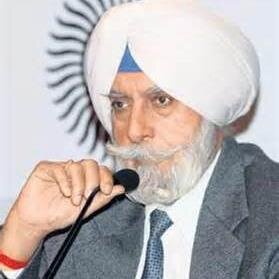The one-time Director General of Police (DGP) in Punjab, KPS Gill, has died from a cardiac arrest today at the age of 82. In recent months, his ill health had been widely reported in the Indian Press and he was said to be suffering from kidney failure and ischaemic heart disease. Gill gained notoriety as the most senior Police official in the Punjab during the late 1980s where he instigated obscene human rights abuses and ordered the suppression of basic civil liberties. Whilst his death is being mourned by State agencies, it is conversely being celebrated by minority groups, most notably the Sikh community who bore the brunt of his crimes. This is neither a sentiment that I can share, nor one that I would hope to see emanating from Sikh thinkers and leaders. Why?
Kanwar Pal Singh Gill became Punjab DGP in 1988 and was tasked with destroying the rising power and influence of the Sikh freedom fighting movement that had gradually gained ground over the State since the events of 1984. His success in doing so led to depictions of a ‘super-cop’ by some in the press and media, but the reality is Gill was able to execute orders carte-blanche, employing all manner of crimes, and not policing, in the land of the five rivers. His autocracy was less organised chaos, and more unscrupulous decimation, destroying generations of Sikh households, male and female, young and old. His tenure was replete with countless allegations of torture, enforced disappearances, false imprisonment, and fabricated criminal cases.
Over a decade ago, a report titled ‘Protecting the Killers: A Policy of Impunity in Punjab, India’ was published by Human Rights Watch and ENSAAF advocating that it was imperative for the Indian State to hold those like Gill responsible for his actions. Unsurprisingly, it yielded no positive results. Now the death of KPS Gill removes the opportunity to see justice served to him directly for the heinous crimes that he committed as an agent of the State. Whilst he might still be held accountable posthumously in the future, it will be of reduced significance in his absence.
I can appreciate that everyday Sikhs will celebrate his demise, which is understandable given the pain and obstacles that he has presented the community with. But for Sikh thinkers and leaders – the Khalsa – this kind of thinking should have been extinguished with the taking of khande-di-pahul. The Khalsa seeks justice in this World and lifetime, demanding a righting of the wrongs that are committed unto the people, and there can be no celebration when the opportunity to seek that redress is taken from us. In stark contrast to the South Asian status quo, a Khalsa looks neither to the heavens for solutions, nor to the afterlife for judgement. I know that I am not alone in my frustration that Gill has got away with a lifetime of inhumanity, but I would like to hope that those who consider themselves Sikh leaders are able to think in the same light.
It’s a fair question to ask what I might have been anticipating to happen, what steps were being taken to hold Gill accountable in his lifetime, the answer to which I would point out the work of human rights organisations, activists, and even credible media outlets that exposed what the Gill-era was all about.
But there is greater reason for which I cannot celebrate his passing. His absence removes another witness who was a very real and living embodiment of the struggle that Sikhs have and continue to face in the subcontinent from State oppression. KPS Gill was a bogeyman whose unabated freedom slapped the face of every Sikh and minority, whether they understood the Punjab issue or not, driving them eventually to want to learn more about why our circumstances are as they are. Children growing up across the World today already experience a white-washed society, where the blood of hundreds of thousands sits just behind the veneer of what is called modernity and progress. And yet they continue to suffer from the new agents of the authoritarian State, devils now cloaked as corporations operating in the shadows; Gill was a combatant that we could all still point to.
Of course I’m not suggesting that I am saddened by his passing, but it is equally difficult for me to celebrate the death of a man whom I needed to witness the ultimate conclusion of his indiscretions: a Sikh community that had come to appreciate its fight for freedom in recent decades was much greater than the sum of those events that led us to this point. We’re not there yet, and it will pain me to know that in this lifetime he evaded that resounding blow.





